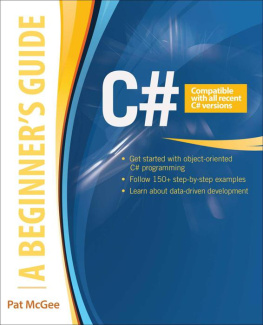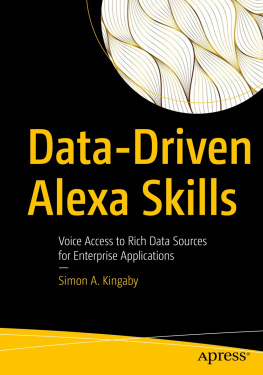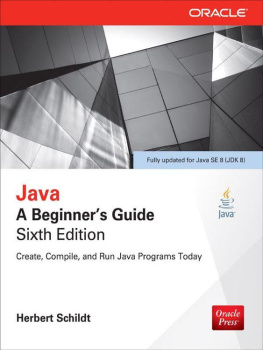About the Author
Pat McGee (Vancouver, British Columbia) is a software development instructor and curriculum developer at the British Columbia Institute of Technology. A former game programmer, McGee has co-authored books on Microsoft XNA Game Studio and is a recipient of Microsofts Most Valuable Professional award for DirectX and XNA. You may contact the author at http://HandsOnCoding.net.
About the Technical Editor
Adam Barney is a nerd. After buying a Commodore 64 with money from his paper route in the fourth grade, hes never stopped learning about computers and how to make these stupid machines do cool things. Adam is now a Microsoft MVP (C#) and ASPInsider, and runs his own independent consulting company, Barney Consulting, in Lincoln, Nebraska.
Copyright 2015 by McGraw-Hill Education. All rights reserved. Except as permitted under the United States Copyright Act of 1976, no part of this publication may be reproduced or distributed in any form or by any means, or stored in a database or retrieval system, without the prior written permission of the publisher.
ISBN: 978-0-07-183581-7
MHID: 0-07-183581-4
The material in this eBook also appears in the print version of this title: ISBN: 978-0-07-183583-1, MHID: 0-07-183583-0.
eBook conversion by codeMantra
Version 1.0
All trademarks are trademarks of their respective owners. Rather than put a trademark symbol after every occurrence of a trademarked name, we use names in an editorial fashion only, and to the benefit of the trademark owner, with no intention of infringement of the trademark. Where such designations appear in this book, they have been printed with initial caps.
McGraw-Hill Education eBooks are available at special quantity discounts to use as premiums and sales promotions or for use in corporate training programs. To contact a representative, please visit the Contact Us page at www.mhprofessional.com.
Information has been obtained by McGraw-Hill Education from sources believed to be reliable. However, because of the possibility of human or mechanical error by our sources, McGraw-Hill Education, or others, McGraw-Hill Education does not guarantee the accuracy, adequacy, or completeness of any information and is not responsible for any errors or omissions or the results obtained from the use of such information.
TERMS OF USE
This is a copyrighted work and McGraw-Hill Education and its licensors reserve all rights in and to the work. Use of this work is subject to these terms. Except as permitted under the Copyright Act of 1976 and the right to store and retrieve one copy of the work, you may not decompile, disassemble, reverse engineer, reproduce, modify, create derivative works based upon, transmit, distribute, disseminate, sell, publish or sublicense the work or any part of it without McGraw-Hill Educations prior consent. You may use the work for your own noncommercial and personal use; any other use of the work is strictly prohibited. Your right to use the work may be terminated if you fail to comply with these terms.
THE WORK IS PROVIDED AS IS. MCGRAW-HILL EDUCATION AND ITS LICENSORS MAKE NO GUARANTEES OR WARRANTIES AS TO THE ACCURACY, ADEQUACY OR COMPLETENESS OF OR RESULTS TO BE OBTAINED FROM USING THE WORK, INCLUDING ANY INFORMATION THAT CAN BE ACCESSED THROUGH THE WORK VIA HYPERLINK OR OTHERWISE, AND EXPRESSLY DISCLAIM ANY WARRANTY, EXPRESS OR IMPLIED, INCLUDING BUT NOT LIMITED TO IMPLIED WARRANTIES OF MERCHANTABILITY OR FITNESS FOR A PARTICULAR PURPOSE. McGraw-Hill Education and its licensors do not warrant or guarantee that the functions contained in the work will meet your requirements or that its operation will be uninterrupted or error free. Neither McGraw-Hill Education nor its licensors shall be liable to you or anyone else for any inaccuracy, error or omission, regardless of cause, in the work or for any damages resulting therefrom. McGraw-Hill Education has no responsibility for the content of any information accessed through the work. Under no circumstances shall McGraw-Hill Education and/or its licensors be liable for any indirect, incidental, special, punitive, consequential or similar damages that result from the use of or inability to use the work, even if any of them has been advised of the possibility of such damages. This limitation of liability shall apply to any claim or cause whatsoever whether such claim or cause arises in contract, tort or otherwise.
Special thanks to my wife, son, mom, and dadfor their love and support.
Contents at a Glance
Contents
Acknowledgments
I wish to thank several people who have offered assistance or guidance, or who have been especially helpful during my career: Brian Anderson, Elsie Au, John Blackwell, Erik Benson, John Bowyer-Smyth, Stephen Cawood, Kevin Cudihee, Marlene Delanghe, Dr. Kim Dotto, Steve Eccles, Medhat Elmasry, Rhonda Ewashko, Lorraine Fentie, Dr. Mirela Gutica, Dr. Dean Hildebrand, Beata Kozma, Jason Harrison, Richard Hart, Uwe Helm, Bill Howorth, Thomas Lane, Shebia Leung, Kate Maclean, Paul Mills, Orrett Morgan, Jeff Parker, Brian Pidcock, Marilyn Stevenson, Ron Terencio, Marlena Vanderwal, Dr. Kimberly Voll, Michael Whyte, Debra Williams, and Dr. Benjamin Yu.
Introduction
T his book offers a simple step-by-step approach to learning object-oriented programming with C# and the .NET Framework while also preparing readers for data-driven development. The content is comprehensive and to the point so that you can learn it quickly. Over 150 examples provide clear references to help you through the material with ease. For hands-on experience, over 150 self test questions throughout the book offer extra practice to solidify your understanding of the material learned. An additional 46 exercises are mixed in with the content throughout the book to help you focus on the most relevant concepts as they are discussed.
A thorough coverage of both LINQ-based and traditional database development is provided so that you can perform an adequately full range of queries and joins that any data-driven developer needs. Additional coverage of file input/output, XML handling, and JSON handling also offers you the flexibility you require to handle alternative sources of data with C#.
This book is great for the new programmer because it covers topics from the ground up, with no prior developer experience required. In addition, experienced programmers who are endeavoring to learn C# will get the no-frills language low-down they need to begin developing advanced data-driven applications in ASP.NET, Windows, or any other C#-based platform.
What This Book Covers
This book covers an introduction to Visual Studio for development and debugging, C# programming basics, a solid object-oriented programming foundation, collections and advanced C# structures, LINQ for database development, and traditional database development, as well as file, XML, and JSON handling.
To get the most from this book, read it sequentially and try all examples in Microsoft Visual Studio whenever possible. Visual Studio is the software required to write, edit, and run C# applications. If you do not have a paid edition, Microsoft Visual Studio 2013 Express for Desktop is free and will run all examples in the book as long as you have Windows 7 or later.
Also, to improve your understanding during the discussions in each chapter, complete the Try This exercises when you encounter them. These exercises offer hands-on practice with the topics currently presented. To further your knowledge of each topic, complete the self test questions at the end of the chapter.





